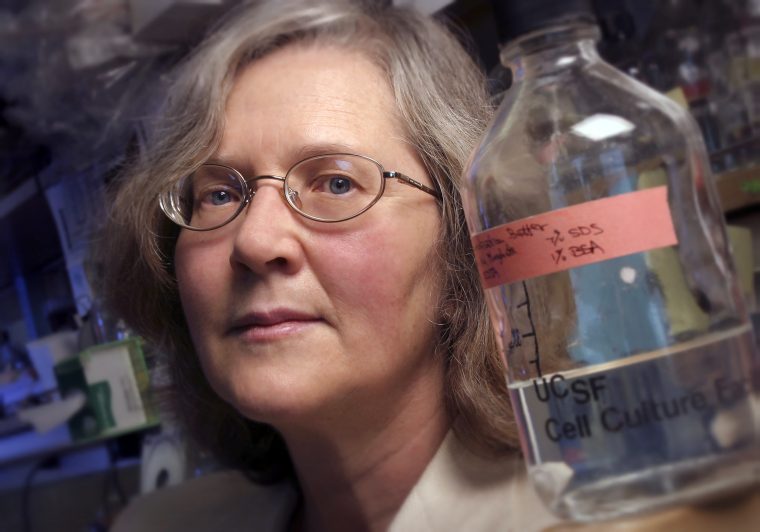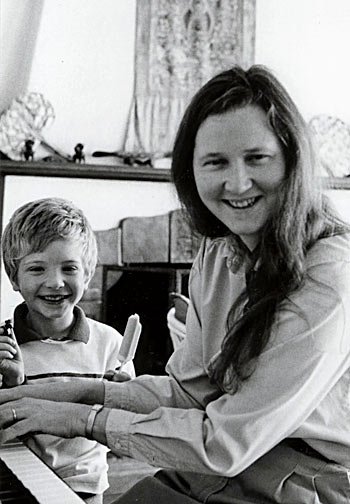Elizabeth Blackburn - Female Scientists Who Aren't Marie Curie
G'day team,
This is the second post in my series on female scientists. While there are many scientists I'd like to write about because they were overlooked in their own time, today's pick is a little different. Elizabeth Blackburn is simply a scientific powerhouse, and someone I couldn't resist writing about!
Past Posts in Series
Anyone else interested in contributing to this series,
please do so by using the tag #womeninscience
Elizabeth Blackburn

Image source
Elizabeth Blackburn is a Nobel Prize winner who was born on the 26th of November in Tasmania, Australia. That's right! Australia! So we're claiming her and I don't bloody care what anyone says about a life lived mostly in the USA...
Moving on...
Elizabeth had a pretty classic upbringing attending a private grammar school in Tasmania, before moving to Melbourne and completing her pre-PhD studies at the University of Melbourne. She then phase-shifted and somehow became a goddamn titan of science, smashing out a PhD at Cambridge and a post-doc at Yale before quickly getting picked up by UC Berkley and going on to launch an extremely successful and prestigious career.
Dr Blackburn's claim to fame is the co-discovery of a section of DNA called the telomere and an associated enzyme which was ingeniously names telomerase. While telomeres had long been hypothesized as necessary components of DNA, it was Blackburn who filled in this outline with details on the structure, function and other biomolecular properties of telomeres.
So what is a telomere, and why is it's discovery worth a Nobel Prize?
Telomeres & Nobel Prize
As most people know, human DNA is packed into units called chromosomes. Like tightly wound cord our DNA protects itself from outside damage by curling down on itself. So, what's the most vulnerable region in a structure like this?
The ends!
Each chromosome has two ends of free DNA which, for a number of technical reasons, are very prone to degradation. A telomere is sort of the guardian of the chromosome. It's a repetitive DNA sequence that sits on the end of a chromosome and protects any degrading processes from damaging useful coding DNA. You can think of telomeres like a tag sitting on the end of a cord of string, protecting it from unraveling.
And that is actually an amazing analogy. Because, as Dr Blackburn discovered, the nucleotide sequence in our DNA is literally TTAGGG. It was while working at Yale on her post-doctoral fellowship that Dr Blackburn did her research into telomeres, and in 2009 she and two colleagues were awarded the Nobel Prize for their work.
But she didn't stop there, Blackburn continued her research on telomeres, and is currently researching the biomolecular mechanisms which contribute to telomere stress and degradation. We now understand the importance of telomeres in aging, cloning and a type of genetic mutations called translocations, all because of Dr Blackburn's work!
Beyond Telomeres
Dr Blackburn's achievments don't end with telomeres and Nobel Prizes. In 2002 she was appointed at the President's Council on Bioethics, but the council terminated by White House under the (shitty, shitty) Bush administration when their advice regarding stem-cell research didn't comply with political lines. Dr Blackburn was a strong supporter of stem cell research and I guess Bush was scared of the impacts real science may have on his his scientifically illiterate supporters.
Dr Blackburn managed to achieve all this while starting a family too!
Amazingly Dr Blackburn is still active, you can even apply to work in her lab here!

Image Source
Thanks
Thanks for reading team! As usual I hope everyone learned something interesting. Feel free to comment, share and vote! Once again, if anyone would like to contribute to this series please feel free by #womeninscience!
Thanks
-tfc
Resources
steemstem

This is an eye opener and I will really love to join you in this... Steem on mate!
Nice piece of article, mate! I've heard about Dr Elizabeth Blackburn and her work when I was studying for my A-Level back in 2011. What I've learned is to never ever underestimate a woman in education.
I did not know her before, thank you
Nice post.
Interesting side note: Elizabeth Blackburn worked in the lab of Fred Sanger who won two Nobel Prizes (one for his method of sequencing proteins and another for his method of sequencing DNA).
That's pretty cool! Thanks for the tip :)